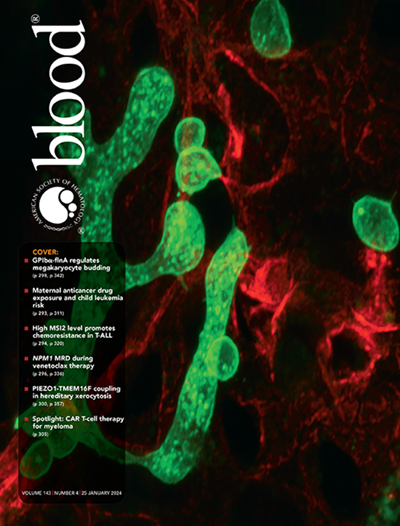α-酮戊二酸促进氨基酸消耗,抑制b细胞淋巴瘤的生长和发展。
IF 23.1
1区 医学
Q1 HEMATOLOGY
引用次数: 0
摘要
长期以来,靶向代谢依赖性和“饥饿”恶性细胞一直被认为是治疗癌症的潜在策略。然而,除了极少数例外,这些演习的实施充满了有限的活动和缺乏特异性。多种细胞质和线粒体转氨酶催化导致氨基酸分解代谢的反应。这些酶使用α -酮戊二酸(αKG)作为氮受体,竞争抑制剂代谢物D-2-HG的积累扰乱了它们的功能。我们假设外源性αKG的补充会影响这些反应的方向性,并消耗癌细胞中的氨基酸。以B细胞淋巴瘤为模型系统,我们发现αKG介导快速和持续的氨基酸消耗,主要是天冬氨酸和支链亮氨酸、缬氨酸和异亮氨酸。亮氨酸水平的降低影响MTORC1亚细胞运动,抑制其活性,并与体外和体内抑制B细胞淋巴瘤生长有关。增加淋巴瘤细胞中天冬氨酸或亮氨酸水平的输入,遗传上迫使MTORC1溶酶体定位或通过BCAT2缺失阻断亮氨酸分解代谢,都减弱了αKG的抗淋巴瘤作用。此外,长期在饲粮中添加αKG(一种无毒性策略)可显著阻碍Eµ-Myc小鼠淋巴瘤的发展,这与氨基酸扰动和能量生成受损有关。我们假设αKG的补充,已经被证明可以改善小鼠的健康和寿命,也编码了显著的抗癌特性。本文章由计算机程序翻译,如有差异,请以英文原文为准。
α-Ketoglutarate promotes amino acid depletion and suppresses B-cell lymphoma growth and development.
Targeting metabolic dependencies and "starving" malignant cells have long been considered as potential strategies to treat cancer. However, with rare exceptions, the implementation of these maneuvers has been fraught with limited activity and lack of specificity. Multiple cytoplasmic and mitochondrial transaminases catalyze reactions that lead to amino acid catabolism. These enzymes use alpha-ketoglutarate (αKG) as a nitrogen acceptor, and accumulation of the competitive inhibitor metabolite D-2-HG perturbs their function. We postulated that exogenous αKG supplementation would influence the directionality of these reactions and deplete amino acids in cancer cells. Using B cell lymphoma as a model system, we found that αKG mediates a rapid and sustained amino acid depletion, principally of aspartate and branched-chain leucine, valine and isoleucine. The decrease in leucine levels influenced MTORC1 sub-cellular movement, suppressed its activity and associated with inhibition of B cell lymphoma growth in vitro and in vivo Increasing import of aspartate or leucine levels in the lymphoma cells, genetically forcing MTORC1 lysosomal localization or blocking leucine catabolism through BCAT2 deletion, all blunted the anti-lymphoma effects of αKG. In addition, long term dietary supplementation of αKG, a toxicity free strategy, significantly hindered lymphoma development in Eµ-Myc mice, in association with amino acid perturbation and impaired energy generation. We posit that αKG supplementation, which has been shown to improve health and lifespan in mice, also encodes marked anti-cancer properties.
求助全文
通过发布文献求助,成功后即可免费获取论文全文。
去求助
来源期刊

Blood
医学-血液学
CiteScore
23.60
自引率
3.90%
发文量
955
审稿时长
1 months
期刊介绍:
Blood, the official journal of the American Society of Hematology, published online and in print, provides an international forum for the publication of original articles describing basic laboratory, translational, and clinical investigations in hematology. Primary research articles will be published under the following scientific categories: Clinical Trials and Observations; Gene Therapy; Hematopoiesis and Stem Cells; Immunobiology and Immunotherapy scope; Myeloid Neoplasia; Lymphoid Neoplasia; Phagocytes, Granulocytes and Myelopoiesis; Platelets and Thrombopoiesis; Red Cells, Iron and Erythropoiesis; Thrombosis and Hemostasis; Transfusion Medicine; Transplantation; and Vascular Biology. Papers can be listed under more than one category as appropriate.
 求助内容:
求助内容: 应助结果提醒方式:
应助结果提醒方式:


